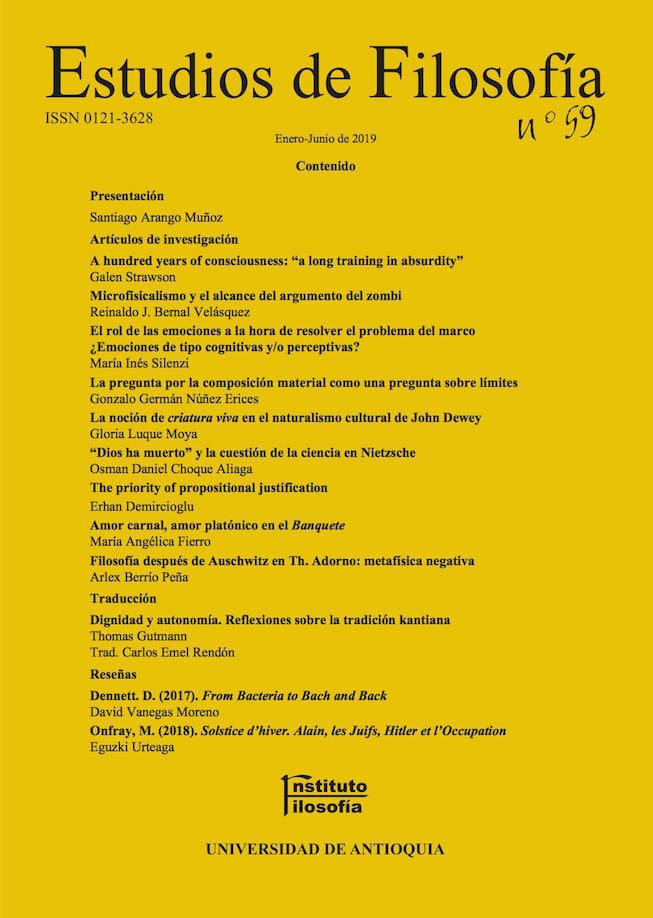The question about material composition as a question about boundaries
DOI:
https://doi.org/10.17533/udea.ef.n59a05Keywords:
composition, boundaries, restrictivism, nihilism, universalism, vaguenessAbstract
Since Peter van Inwagen in his book Material Beings (1990) raised The Special Composition Question, many lines have been written about the conditions for two or more material objects to compose a further object. This paper proposes a study of the relationship between composition and the notion of boundary. The question about composition entails drawing a boundary to determine when it occurs and when it does not. There are three traditional answers: restrictivism, universalism, and nihilism. While according to restrictivism, composition occurs occasionally, according to universalism and nihilism, it occurs either always or never respectively. Nonetheless, despite the opposition of these two answers, both have a common target: to avoid the existence of ontologically vague boundaries for material composition. Thus, how a boundary is drawn will determinewhat kind of things we accept as components of the world.
Downloads
References
Bolzano, B. (2014). Paradoxes of the Infinite (D. A. Steele, Trans.) London: Routledge & Kegan Paul.
Brentano, F. (1988). Philosophical Investigations on Space, Time and the Continuum (B. Smith, Trans.). New York: Routledge.
Casati, R., & Varzi, A. (1999). Parts and Places: The Structure of Spatial Representation. Cambridge MA: MIT Press.
Casati, R., & Varzi, A. (2000). Topological Essentialism. Philosophical Studies: An International Journal of Philosophy in the Analytic Tradition, 100(3), 217-236.
Chisholm, R. (1976). Person and Object: A Metaphysical Study. Illinois: Open Court Publishing Company.
Gibbard, A. (1975). Contingent Identity. Journal of Philosophical Logic, 187-221.
Hawley, K. (2014). Ontological Innocence. In A. J. Cotnoir, & D. L. Baxter, Composition as Identity (pp. 70-89). Oxford: Oxford University Press.
Johnston, M. (1992). Constitution is not Identity. Mind, 89-105.
Koons, R., & Pickavance, T. (2015). Metaphysics: The Fundamental. Oxford: Wiley Blackwell.
Koslicki. (2008). The Structure of Objects. Oxford: Oxford University Press.
Lewis, D. (1986). The Plurality of World. Oxford: Blackwell.
Lewis, D. (1991). Parts and Classes. Cambridge MA: Basil Blackwell.
Markosian, N. (1998). Brutal Composition. Philosophical Studies: An International Journal in the Analytic Tradition, 92(3), 211-249.
Merricks, T. (2001). Objects and Persons. Oxford: Oxford University Press.
Noonan, H. W. (1993). Constitution is Identity. Mind, 133-145.
Rea, M. (1998). In Defense of Mereological Universalism. Philosophy and Phenomenological Research, 58(2), 347-360.
Shoemaker, S. (1970). Wiggins on Identity. The Philosophical Review, 529-544.
Sider, T. (2013). Against Parthood. In D. Zimmerman, Contemporary Debates in Metaphysics (Vol. 8, pp. 237-293). Oxford: Blackwell.
Simons, P. (1987). Parts: A Study in Ontology. New York: Oxford University Press.
Unger, P. (1979). There are no Ordinary Things. Synthese, 41(2), 117-154.
Unger, P. (1980). The Problem of Many. Midwest Studies in Philosophy, 5, 411-467.
Unger, P. (1997). I do not Exist. In M. Rea, Material Constitution: A Reader (pp. 175-190). Oxford: Rowman & Littlefield Publisher.
van Inwagen, P. (1990). Material Beings. London: Cornwell University Press.
Varzi, A. (1997). Boundaries, Continuity, and Contact. Noûs, 31(1), 26-58.
Varzi, A. (2016, Abril 15). Mereology. Retrieved April 2018, from Stanford Encyclopedia of Philosophy: https://plato.stanford.edu/entries/mereology/
Wiggins, D. (1980). Sameness and Substance. Oxford: Basil Blackwell.
Published
How to Cite
License
Copyright (c) 2019 Gonzalo Germán Núñez Erices

This work is licensed under a Creative Commons Attribution-NonCommercial-ShareAlike 4.0 International License.
Authors who publish with this journal agree to the following terms:
1. The Author retains copyright in the Work, where the term "Work" shall include all digital objects that may result in subsequent electronic publication or distribution.
2. Upon acceptance of the Work, the author shall grant to the Publisher the right of first publication of the Work.
3. The Author shall grant to the Publisher a nonexclusive perpetual right and license to publish, archive, and make accessible the Work in whole or in part in all forms of media now or hereafter known under a Creative Commons Attribution-NoCommercia-ShareAlike (CC BY-NC-SA 4.0), or its equivalent, which, for the avoidance of doubt, allows others to copy, distribute, and transmit the Work under the following conditions: (a) Attribution: Other users must attribute the Work in the manner specified by the author as indicated on the journal Web site;(b) Noncommercial: Other users (including Publisher) may not use this Work for commercial purposes;
4. The Author is able to enter into separate, additional contractual arrangements for the nonexclusive distribution of the journal's published version of the Work (e.g., post it to an institutional repository or publish it in a book), as long as there is provided in the document an acknowledgement of its initial publication in this journal;
5. Authors are permitted, and Estudios de Filosofía promotes, to post online the preprint manuscript of the Work in institutional repositories or on their Websites prior to and during the submission process, as it can lead to productive exchanges, as well as earlier and greater citation of published work (see The Effect of Open Access). Any such posting made before acceptance and publication of the Work is expected be updated upon publication to include a reference to the Estudios de Filosofía's assigned URL to the Article and its final published version in Estudios de Filosofía.















